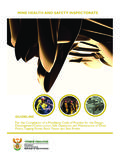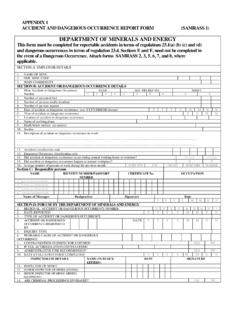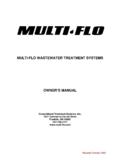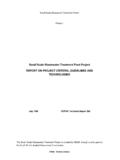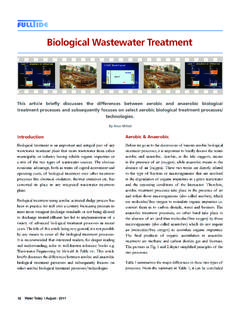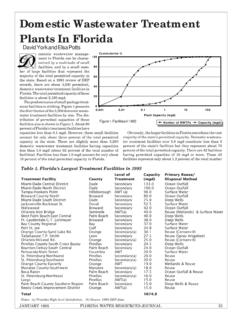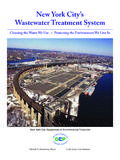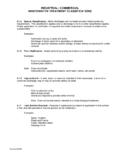Transcription of Water and Wastewater Treatment Processes and …
1 Water and Wastewater Treatment Processes and Operations Courses: Courses associated with Water and Wastewater Reticulation, Systems Treatments, Processes and Operations: NQF Level 1 - 4. 1. Our Key Training Focus Industries: At OSI we specialise in NQF certified training courses for industries like Mining, Energy, Water Services, Municipalities, State Departments, Construction, Environmental and Health and Safety. Our training courses are unit standard based which means that candidates successfully completing our courses will achieve nationally recognized credits which they may present towards achieving a whole qualification in Water and Wastewater Treatment Processes and operations or various other qualifications (see the index table on page 3 of this document). In acquiring these competencies, the qualifying delegate will lay a good foundation for future learning and action and better understand the broader context of his or her own work. Achieving these unit standards will enhance the employability of the qualifying delegate in the Water , mining and other related sectors.
2 2. Training courses: We firmly believe in outcomes-based, onsite training where our clients can discuss their specific training problems and requirements with us and we, in return, design a tailor made action plan to address and focus on the identified problem areas. In this type of training we actually visit the premises of our client to provide the training in order to solve problems, improve skills and share information. Delegates are demonstrated how to apply what they have learnt within their organisation and this approach will result in reduced costs, improved productivity and overall profitability. Our highly skilled research team uses advanced research methodologies to identify training gaps in the market and sectors. We are then able to produce high level training programmes to provide the innovative solutions to close these problematic gaps. After successful completion of our training programmes, delegates will walk away with the necessary skills, knowledge and information which they can implement in their respective organisations.
3 Again, this will lead to higher skilled employees, improved productivity and cost reduction as well as a long term improvement in profitability and efficiency. Delegates will receive a certificate certifying him/her as competent in the relevant NQF Unit Standard and reflecting the credits earned. Our training courses are highly interactive and workplace-based (we only provide onsite training), with more emphasis on hands-on learning and the theory component being addressed in the most practical manner and assessments conducted according to the OBE practices. On average, our single unit course duration varies between 1 -3 days of facilitation and 1-3 days of workplace based activities, observations and assessments variable depending on the criteria (see paragraph ). Leanership programmes will be conducted over a period of time and will be quoted for separately and on request. 3. Workplace Assessments Consolidation of Portfolios of Evidence normally takes place 2-3 days after the completion of the training course.
4 Delegates are encouraged to practice what they have learned prior to commencement of these on-site assessments. Assessment and moderation of assessment will be overseen by the relevant ETQA according to the ETQA policies and guidelines for assessment and moderation. Moderation will include both internal and external moderation of assessments at exit points of the qualification, unless ETQA. policies specify otherwise. Moderation will also encompass achievement of the competence described both in individual unit standards as well as the integrated competence described in the qualification. 4. Benefits to the organisation: Copyright Open Systems Integrators 2011 Courses associated with Water and Wastewater Reticulation, Systems, Treatments, Processes and Operations: NQF Level 1 4 Page 1 of 23. Cost savings with more effective group training. Training times crafted around your schedule minimising the impact on your business. The ability to address specific employee training needs and tailoring course objectives to suit your specific requirements.
5 No travel time and accommodation costs for delegates with on-site training. Convenience training programs are delivered at a time and location that fit in with your business schedule. Having only your own delegates on the course will create focus and discussion on the issues that are important to your organisation. Hand-picked trainer/s that fit training needs. Printed Learner and Assessment Guides will be handed out which will provide delegates with future reference in their careers. SETA accreditation. Course fees reimbursed from SETA for members of the National Skills Fund in the form of a percentage paid to the skills fund or by means of ordinary or discretionary grant from SETA (please contact SETA for more information). SARS claims can be made for tax benefits of training costs. 5. Our presenter (specialising in training for Water and Wastewater Treatment Processes and Operations) is a certified NQF Level 5 Assessor, NQF Level 6 Moderator, NQF Level 7 Verifier and NQF Level 5 RPL Advisor.
6 He has a BSC Honours Degree in Water Utilization and is currently in the process of acquiring his ETDP NQF Level 5 certification. He has practiced as Water Treatment practitioner at Rand Water for 8 years and was involved in writing some of the unit standards currently used in the leanerships for Water and Waste Water Treatment . He has also delivered a paper on process controlling training at the ESETA and WISA conferences and served in the SGB for SETA. 6. The following Water and Wastewater Treatment Processes Courses are available as individual training modules or can form part of a leanership programme or national qualification (NQF Level 1 4). Please note that the duration of theses onsite courses and workplace- based assessments will depend on the amounts of NQF Unit Credits assigned to the module and delegates attending per session. The following pertain to NQF Level 1 4 on average: 1-5 credits: normally 1 day training session, 1 day workplace-based assessments (per class of 15 delegates).
7 6-9 credits: normally 2 days training sessions, 2 days' workplace-based assessments (per class of 15 delegates). 10+ credits: normally 3 days training sessions, 3 days' workplace-based assessments (per class of 15 delegates). For example: Course D260N: Demonstrate knowledge of activated sludge Processes in Wastewater Treatment : 6 Credits: 30 delegates: Training session 1: 2 days training 2 days' workplace-based assessments 15 delegates attending. Training session 2: 2 days training 2 days' workplace-based assessments 15 delegates attending. PLEASE SEE OUR CONTACT DETAILS ON THE LAST PAGE OF THIS DOCUMENT. TABLE INDEX NQF UNIT STANDARD ID. National Certificate: Water and Wastewater Process Operations (NQF Level 2) (58951) C = Core module National Certificate: Water and Wastewater Reticulation Services (NQF Level 3) (60155) F = Fundamental National Certificate: Water and Wastewater Reticulation Services (NQF Level 2) (60169) E = Elective Further Education & Training Certificate: Water and Wastewater Reticulation Services: (NQF Level 4) (60189) = New NQF Level Assignment Pending National Certificate: Water and Wastewater Process Control (NQF Level 3) (60190) NQF LEVEL.
8 Further Education & Training Certificate: Water and Wastewater Treatment Process Control Supervision: (NQF Level 4) (61709) NQF CREDITS. Copyright Open Systems Integrators 2011 Courses associated with Water and Wastewater Reticulation, Systems, Treatments, Processes and Operations: NQF Level 1 4 Page 2 of 23. Kindly note that the following course information is basic. A detailed brochure is available on each of the courses listed below. Although all care has been taken to provide the correct information below, SETA can change information at any time without notifying OSI. OSI can therefore not be held responsible for incorrect information displayed below. Course information will only be confirmed upon providing the detailed brochure or quote on each course. COURSES associated with Water and Wastewater Reticulation, Systems, Treatments, Processes and Operations: NQF Level 1 - 4. NQF OSI COURSE TITLE C NQF NQF. UNIT COURSE DESCRIPTION AND OUTCOMES E LEV CRED.
9 STD ID CODE UNIT CREDIT ACCUMILATIONS F. 254116 D260N Demonstrate knowledge of activated sludge Processes in Wastewater Treatment E 3 6. This course is intended for delegates who are working with activated sludge in order to produce effluent in compliance with organisational standards. The delegate will understand the principles of the activated sludge process and be familiar with the layout of the plant. Delegates credited with this unit standard will be able to: Describe the theory of activated sludge. Describe the layout of the plant. Make adjustments on the plant. Monitor performance of the plant. Unit credits accumulation towards a National Certificate: Water and Wastewater Process Operations (NQF Level 3 with 6 credits). 246440 D270N Operate coagulation, flocculation and sedimentation Processes E 2 10. The delegate successfully completing this course and achieving this unit standard will be able to contribute towards optimal functioning of plant Processes .
10 The delegate will be provided with skills and knowledge relevant to the operation of the coagulation, flocculation and sedimentation Processes within the relevant health, safety and legislative guidelines. This unit standard will contribute to the delivery of quality Water to consumers. Delegates achieving this unit standard will demonstrate competence in: Performing jar tests. Evaluating the flash mixing and coagulation process. Monitoring the flocculation process. Operating the sedimentation process. Operating sludge withdrawal process. Unit credits accumulation towards a National Certificate: Water and Wastewater Process Operations (NQF 2 Level with 10 credits). 246441 D280N Maintain maturation and oxidation ponds E 1 2. The delegate successfully completing this course and achieving this unit standard will be able to maintain maturation and oxidation ponds to ensure optimal functioning of the ponds. This competence will ensure that the Water environment is economically sustained and protected in accordance with legislation and regulations.


